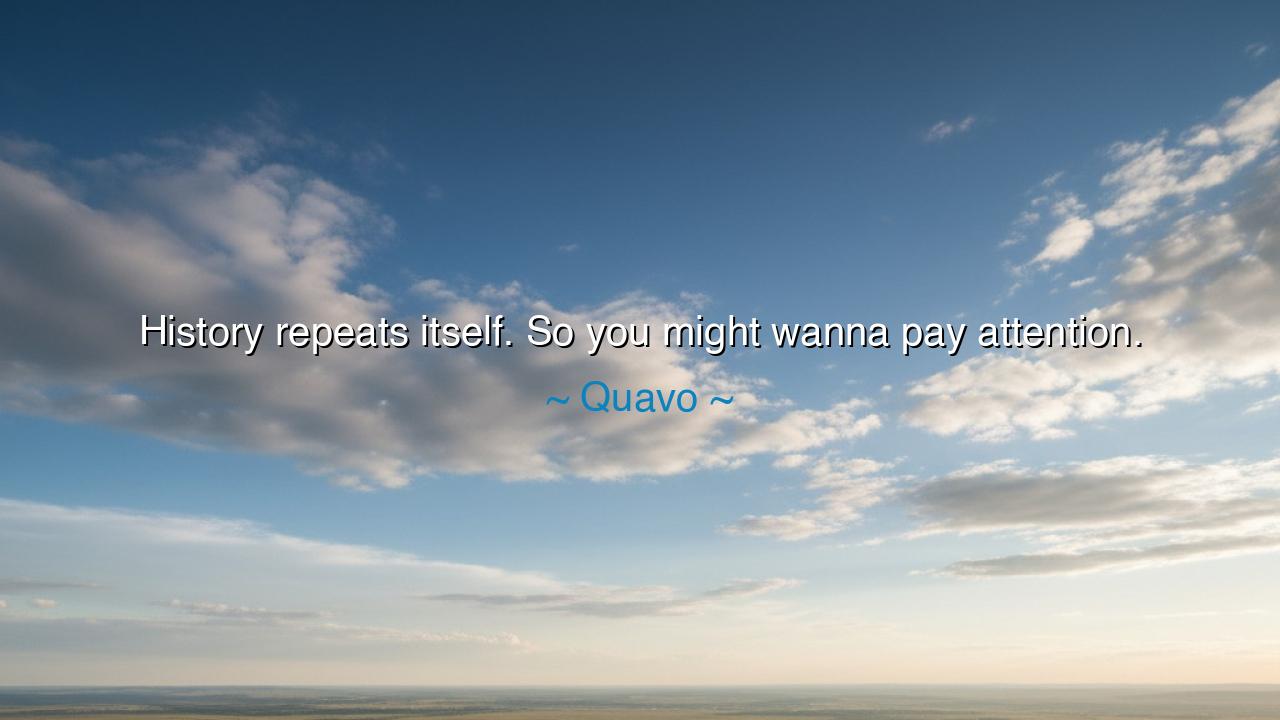
History repeats itself. So you might wanna pay attention.






“History repeats itself. So you might wanna pay attention.” — Thus spoke Quavo, a voice of the modern age, yet echoing wisdom as old as time itself. Beneath the simplicity of these words lies a profound truth: that humanity moves in circles, not lines, and that those who fail to learn from the past are doomed to relive its tragedies. Though Quavo is a poet of rhythm and verse, his insight belongs to the lineage of prophets and philosophers, for he reminds us that history is not merely a record of what has been—it is a mirror of what may come again.
To say that history repeats itself is to understand that the hearts of men and women do not change easily. The same desires, the same fears, the same ambitions that moved kings and rebels of old still stir within us today. New faces appear, new nations rise, but the pattern remains—the lust for power, the blindness of greed, the silence of the fearful, the courage of the few. Civilizations rise upon virtue and fall upon arrogance. Wars begin for pride and end in sorrow. Every age believes itself wiser than those before it, yet it stumbles over the same stones, because it has forgotten to pay attention.
Quavo’s words are not spoken to scholars in ivory towers, but to the everyday soul—to those who live, act, and decide without seeing how deeply they walk the paths of their ancestors. In his world, where fame and power rise swiftly and fall suddenly, he knows that what happened once will happen again. The story of triumph followed by downfall, of abundance turning to scarcity, of unity dissolving into division—these are not relics of the past. They are eternal rhythms, beating in the pulse of human society. His warning is not poetic flourish; it is survival wisdom: watch, listen, learn, or you will repeat the mistakes of those who came before you.
Consider the tale of the Great Depression. In the 1920s, the world celebrated prosperity without restraint. Banks lent recklessly, people spent extravagantly, and nations believed the good times would last forever. Then, like a house of cards, it all collapsed. Years of hardship followed, and the lesson seemed burned into humanity’s memory. Yet decades later, in the early 2000s, history repeated itself—greed once more outweighed caution, and the world plunged into another financial crisis. The costumes changed, the technology advanced, but the spirit of folly was the same. If only more had paid attention, perhaps the suffering could have been avoided.
But history does not repeat only in grand empires or economies—it repeats in the human heart. The jealous lover, the ungrateful friend, the unjust ruler—all are reincarnations of ancient stories. How many times must we betray before we understand loyalty? How many wars must we wage before we understand peace? The lessons of history are written not only in books, but in the consequences of our actions. Every day we are given the choice to continue the cycle or to break it—to remember, or to forget. And those who forget are doomed to play their part again in the endless tragedy of repetition.
Yet Quavo’s tone carries not despair, but urgency. His words challenge us to wake from the dream of modern arrogance—the belief that we are beyond the reach of history. He reminds us that to pay attention is to take responsibility: to read, to listen, to observe, and to question. For every pattern seen can be prevented, and every repetition recognized can be rewritten. Wisdom begins where memory is honored. The greatest civilizations were not those that conquered lands, but those that learned from their own past.
Let this be your lesson, O listener: you are both the child and the heir of history. Every action you take adds a line to its pages. Do not dismiss the past as old or irrelevant, for it breathes still within you. Study it—not as a scholar studies dust, but as a traveler studies maps, that you may not lose your way. Learn from the failures of others, and you will not need to suffer them yourself. Learn from their courage, and you will know how to stand when your time of testing comes.
And so remember, as Quavo teaches, that history repeats itself—and you must pay attention. For ignorance is the seed of ruin, but awareness is the beginning of wisdom. Let your eyes be open, your memory alive, and your conscience awake. The patterns of the past will rise again, but you, armed with understanding, may be the one to change their course. For though history may move in circles, the wise have the power to break the wheel.






AAdministratorAdministrator
Welcome, honored guests. Please leave a comment, we will respond soon